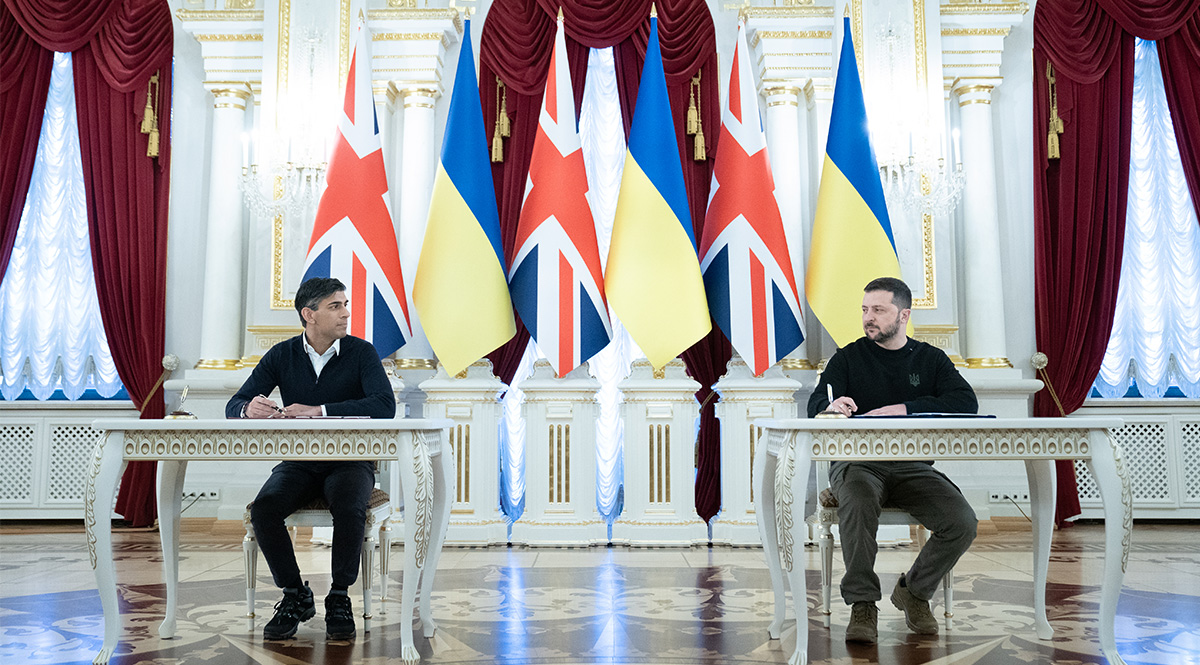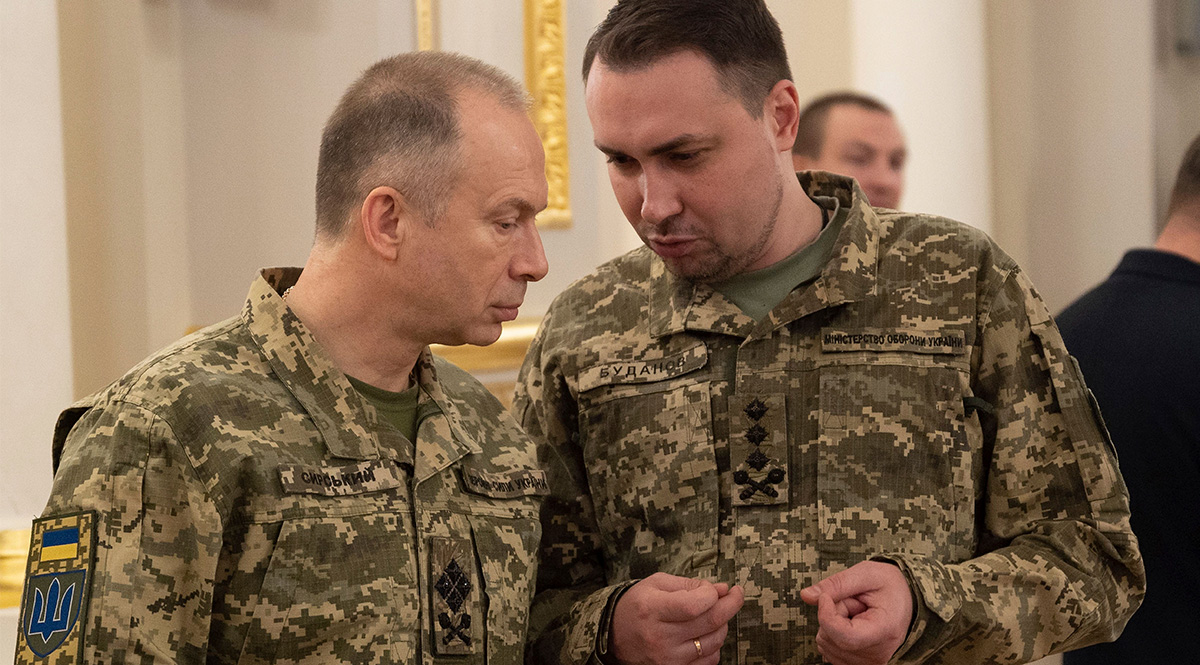Bilateral Security Agreements with Ukraine Present Opportunities and Challenges
Bilateral agreements signed by a series of NATO members with Ukraine raise the pressure to at least maintain support for the country at the current level. As the UK, France, and Germany were first to sign the agreements, they will serve as a point of reference for other countries. Poland could consider adopting an agreement based on the British and French models before the NATO summit in July in Washington.
 LIESA JOHANNSSEN / Reuters / Forum
LIESA JOHANNSSEN / Reuters / Forum
On 16 February, Germany and France, followed by Denmark (23 February), Italy (24 February) and Canada (24 February) signed bilateral security cooperation agreements with Ukraine. The United Kingdom signed a similar agreement in January. They are the result of the declaration adopted in July 2023 in which the G7 countries promised long-term security assurances for Ukraine and mechanisms of support in the event of renewed Russian aggression. The priority was to strengthen Ukrainian air defence systems, artillery, long-range strike capabilities, armour, and combat aviation. Since then, an additional 25 countries have announced their readiness to sign such agreements.
Strengthening of Defence and Deterrence
The agreements indicate that France, Germany, and the United Kingdom have similar priorities when it comes to the development of Ukrainian air defence, artillery, and armour. They will also support the development of other capabilities on a bilateral basis, but also within multinational coalitions. All countries maintained their previous commitments to lead coalitions focused on the development of maritime capabilities (UK), air defence and artillery (France), and integrated air and anti-missile defence (Germany). The agreements also emphasise the readiness to support the Ukrainian defence industry so that Ukraine can produce as many weapons as possible on its own territory.
All agreements contain a similar clause in case Russia resumes aggression in the future. Within 24 hours of an invasion, Ukraine will be able to use a special consultation mechanism to receive additional support in equipment and weapons, and additional sanctions and other costs are to be imposed on Russia.
However, the agreements also indicate significant differences in the approach to strengthening Ukraine’s defence and deterrence capabilities. The French and British agreements specify that their aim is to strengthen active deterrence. Both countries have put long-range strike capabilities and the air force on their priority list. This indicates that they assume the possibility of attacking Russian targets deep behind enemy lines. The United Kingdom has already provided Ukraine with Storm Shadow cruise missiles and France has given it the SCALP equivalent, which can be launched by aircraft and destroy targets from a distance of approximately 350-400 kilometres. The agreement with Germany, which consistently refuses to transfer long-range Taurus missiles to Ukraine, does not mention active deterrence nor does it include long-range strike capabilities and the air force on the list of priorities. However, it emphasises that the transferred weapons must be used in accordance with international law, which may indicate concerns about attacking civilian targets and Russian territory.
Germany promises Ukraine assistance on a larger scale than the other two countries, however. According to the agreement, the Germans intend to transfer equipment and weapons worth €7.1 billion this year. This would be an increase of €2 billion compared to the level of aid in 2023. France’s support is to increase from €2.1 billion in 2023 to €3 billion in 2024, and the United Kingdom’s assistance is to rise from €2.7 billion (£2.3 billion) to €2.9 billion (£2.5 billion). Although all agreements are valid for 10 years with the possibility of extension, none of the countries declared the amount of support beyond 2024. Germany and the United Kingdom only assured that assistance would be provided for as long as necessary.
Ukraine’s Place in the European Security Order
The agreements indicate continuing differences in the approach to Ukraine’s membership in NATO. The United Kingdom and France clearly declared that they support Ukraine’s membership in the Alliance and emphasise that it would contribute to the security and stability of Europe. They announced that they will coordinate and strengthen cooperation with Ukraine regarding its admission to NATO. They also emphasise that the development of Ukraine’s potential in line with NATO standards is to facilitate its integration with the Alliance. This is a sign of a significant change in the policy of France, which did not support Ukraine’s admission to NATO before the Russian aggression against Ukraine in February 2022. France and the UK have signalled that the agreements are not intended to be an alternative to membership in the Alliance and that Ukraine could become a member before the agreements expire. They announced that they will strive to strengthen Ukraine’s military potential so that in the event of an attack on their countries, Ukraine will be able to support them.
German declarations of support for NATO membership are ambiguous. They are implied in statements about support for Ukraine's Euro-Atlantic aspirations. Where the agreement directly refers to Ukraine’s aspirations for NATO and EU membership, Germany emphasises that Ukraine must first carry out the necessary reforms. The importance of reforms and the fight against corruption is also highlighted in other agreements, but the German document makes it more prominent. The agreement mentions increasing the interoperability of Ukrainian and NATO troops, but not in the context of preparing Ukraine for membership. At the same time, all three countries declare support for Ukraine in its efforts to become a member of the European Union. They also seem to have similar approach to the Ukrainian peace initiative (peace formula). On the one hand, they declare support for it but, on the other hand, indicate that it may be one of several ways to ensure peace in accordance with the principles of the United Nations Charter.
Conclusions and Perspectives
The agreements may bring clear benefits to the situation in the short term. Major European powers indicate that they are ready not only to maintain but also to increase their support for Ukraine in 2024, which will create pressure on other countries to at least continue assistance at the previous level. This should help weaken the negative political effects of the decision-making paralysis in the U.S. where there have been problems with adopting another financial aid package for Ukraine, currently proposed at $61 billion. The agreements will also be important in the context of the NATO summit in Washington (9-11 July), which will be held before the U.S. presidential elections. It will be easier for European allies to point out their contribution to protecting common security and strategic interests when the U.S. is unable to provide the necessary leadership.
The importance of the agreements in the long term is not so obvious. On the one hand, they can exert pressure on countries supporting Ukraine to continue assistance in the long term. They can support the development of industrial and defence capabilities for the needs of Ukraine’s and NATO’s defence and deterrence, and send a message to Russia that it will not achieve its goals by fighting a war of attrition. On the other hand, the agreements are not subject to ratification and can be terminated with a period of 6 months’ notice, which makes it possible to withdraw from them after a change of government. They also do not specify the scale of assistance after 2024, which creates a risk of a reduction in scale and scope in the following years. Some countries may also use them as an excuse not to present more specific NATO accession conditions to Ukraine and to delay the decision on its admission to NATO.
Poland may consider signing an agreement with Ukraine before the NATO summit in Washington. That would strengthen the coalition of countries that declare clear support for Ukraine’s accession to NATO and the EU. The more countries declaring explicit support for Ukrainian membership, the greater the pressure on others to also recognise that it is an essential element of the new Euro-Atlantic security architecture. It will be also important to indicate in the agreement readiness to increase the scale of assistance to Ukraine in 2024 and support deterrence with long-range strike capabilities. Poland, like France and the United Kingdom, could also point out that Ukraine’s military capabilities should be at such a level that in the event of external military aggression against Poland, Ukraine would be able to provide effective military assistance to it.



.jpg)

